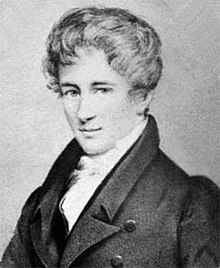
Back Niels Henrik Abel Afrikaans Niels Henrik Abel AN نيلس هنريك أبيل Arabic نيلز هنريك ابيل ARZ নীলছ্ হেনৰিক্ আবেল Assamese Niels Henrik Abel AST Nils Abel Azerbaijani نیلس هنریک آبل AZB Нільс Хенрык Абель Byelorussian Нільс Гэнрык Абэль BE-X-OLD
This article needs additional citations for verification. (September 2022) |
Niels Henrik Abel | |
|---|---|
 | |
| Born | 5 August 1802 |
| Died | 6 April 1829 (aged 26) |
| Nationality | Norwegian |
| Alma mater | Royal Frederick University (BA, 1822) |
| Known for | Abel's binomial theorem Abel equation Abel equation of the first kind Abelian extension Abel function Abelian group Abel's identity Abel's inequality Abel's irreducibility theorem Abel–Jacobi map Abel–Plana formula Abel–Ruffini theorem Abelian means Abel's summation formula Abelian and tauberian theorems Abel's test Abel's theorem Abel transform Abel transformation Abelian variety Abelian variety of CM-type Dual abelian variety |
| Scientific career | |
| Fields | Mathematics |
| Academic advisors | Bernt Michael Holmboe |
| Signature | |
Niels Henrik Abel (/ˈɑːbəl/ AH-bəl, Norwegian: [ˌnɪls ˈhɛ̀nːɾɪk ˈɑ̀ːbl̩]; 5 August 1802 – 6 April 1829) was a Norwegian mathematician who made pioneering contributions in a variety of fields.[1] His most famous single result is the first complete proof demonstrating the impossibility of solving the general quintic equation in radicals. This question was one of the outstanding open problems of his day, and had been unresolved for over 250 years.[2] He was also an innovator in the field of elliptic functions and the discoverer of Abelian functions. He made his discoveries while living in poverty and died at the age of 26 from tuberculosis.
Most of his work was done in six or seven years of his working life.[3] Regarding Abel, the French mathematician Charles Hermite said: "Abel has left mathematicians enough to keep them busy for five hundred years."[3][4] Another French mathematician, Adrien-Marie Legendre, said: "What a head the young Norwegian has!"[5]
The Abel Prize in mathematics, originally proposed in 1899 to complement the Nobel Prizes (but first awarded in 2003), is named in his honour.
- ^ Ore, Øystein (18 April 2018). "Niels Henrik Abel". Store Norske Leksikon (in Norwegian).
- ^ "Niels Henrik Abel". www.matematikk.org (in Norwegian). Retrieved 5 May 2018.
- ^ a b "Charles Hermite Quotes - 2 Science Quotes - Dictionary of Science Quotations and Scientist Quotes". Retrieved 12 September 2015.
- ^ "Welcome to nginx!". Archived from the original on 8 August 2013. Retrieved 8 August 2013.
- ^ "Niels Abel". Archived from the original on 9 May 2015. Retrieved 12 September 2015.